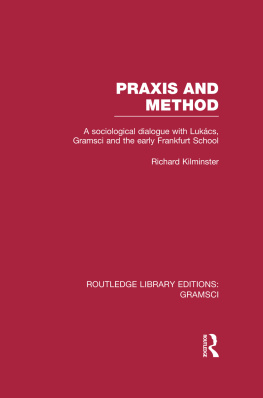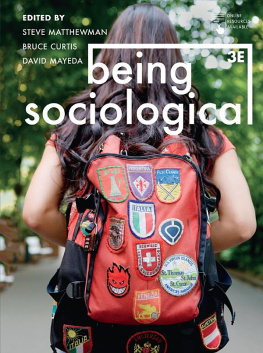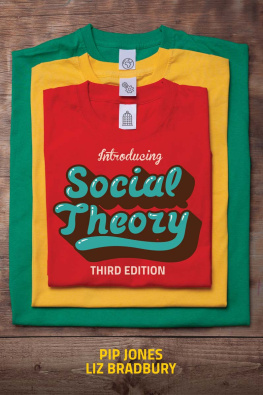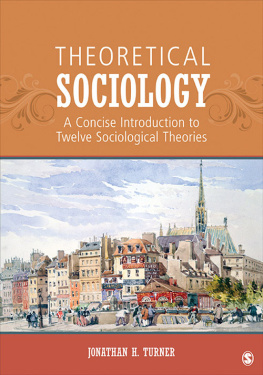Steven Loyal
I would like to dedicate this book to my family for their support and help and for missing spending invaluable time with them. My mother, Lakbhir Kaur, my partner, Andrea and my sons, Edgar and Theo.
Sinisa Malesevic
I would like to dedicate this book to my parents, Ljubica and Krstan Maleevi, who always supported all my life choices.
SAGE Publications Ltd
1 Oliver's Yard
55 City Road
London EC1Y 1SP
SAGE Publications Inc.
2455 Teller Road
Thousand Oaks, California 91320
SAGE Publications India Pvt Ltd
B 1/I 1 Mohan Cooperative Industrial Area
Mathura Road
New Delhi 110 044
SAGE Publications Asia-Pacific Pte Ltd
3 Church Street
#10-04 Samsung Hub
Singapore 049483
Editor: Natalie Aguilera
Assistant editor: Eve Williams
Production editor: Katherine Haw
Copyeditor: Neville Hankins
Proofreader: Camille Bramall
Indexer: Charmian Parkin
Marketing manager: George Kimble
Cover design: Francis Kenney
Steven Loyal and Sinia Maleevi 2021
First published 2021
Apart from any fair dealing for the purposes of research or private study, or criticism or review, as permitted under the Copyright, Designs and Patents Act, 1988, this publication may be reproduced, stored or transmitted in any form, or by any means, only with the prior permission in writing of the publishers, or in the case of reprographic reproduction, in accordance with the terms of licences issued by the Copyright Licensing Agency. Enquiries concerning reproduction outside those terms should be sent to the publishers.
Library of Congress Control Number: 2019956907
British Library Cataloguing in Publication data
A catalogue record for this book is available from the British Library
ISBN 978-1-5297-2574-2
ISBN 978-1-5297-2573-5 (pbk)
Printed in the UK
At SAGE we take sustainability seriously. Most of our products are printed in the UK using FSC papers and boards. When we print overseas we ensure sustainable papers are used as measured by the PREPS grading system. We undertake an annual audit to monitor our sustainability.
About the authors
Steven Loyalis Associate Professor at the School of Sociology at University College Dublin, Ireland. His areas of interest include sociological theory, migration, the sociology of knowledge, social stratification and historical sociology.Sinia Maleeviis a Full Professor of Sociology at the University College, Dublin. His recent books include Grounded Nationalisms (CUP, 2019), The Rise of Organised Brutality, (CUP 2017) and Nation-States and Nationalisms (Polity 2013). His work has been translated into 12 languages.
Acknowledgements
This book together with the accompanying volume Classical Sociological Theory were initially commissioned as a single book. However, as the project developed over the years it became clear that the final product was too big for a single volume. Thus, the original manuscript was shortened and split into two books Classical Sociological Theory and Contemporary Sociological Theory. We would like to thank Chris Rojek for commissioning this project and the SAGE editorial team for their continuous support during the writing process. We are especially grateful to Roddy Condon for his work on the boxed pedagogical material and references. We would also like to thank Tim Mooney, Paul Keating and Barry Barnes for help and comments. Most of all we are thankful to our families for their patience and support during the several years that we were working on this project.
Introduction: Sociological Theory in Context
This book, like its companion volume, Classical Sociological Theory, follows in the footsteps of Lewis Coser's 1971 classic textbook Masters of Sociological Thought: Ideas in Historical and Social Context. Coser's book was rather unusual at the time of its publication: instead of just summarising the key concepts and theories of leading social theorists it attempted to situate each thinker within the broader social, political, cultural and historical context. Whereas most textbooks offered a few general remarks on the author's biography and some would devote a couple of paragraphs to the historical period, Coser's book very successfully integrated a discussion on the key theoretical contributions of each theorist with an extensive treatment of the wider social contexts, biographical and intellectual influences, and the analysis of historical changes that took place during the author's lifetime.
A central approach underpinning Coser's book derives from the sociology of knowledge, which foregrounds the idea that the production of knowledge is context-dependent. The term sociology of knowledge originates with Max Scheler but has its roots in two sociological figures: Marx and his claim that social being determines consciousness; and Durkheim with his analysis of the social nature of the categories and classification systems. There have, however, been attempts to combine both standpoints, specifically in the work of Bourdieu. In his analysis of the work of Heidegger, Bourdieu (1991 [1988]) identifies the existence of socio-political and sociological moments as reflecting two analytically distinct fields. Although both of these fields possess a certain relative autonomy and follow a different logic', it is possible for one field to become translated into the other. This forms a central underpinning of our approach.
There is no doubt that sociology, as other social science disciplines, is the brainchild of the Enlightenment. The very idea that one could try to understand and explain the social world without invoking the established religious, mythical or imperial doctrines and the authorities of the Church, monarchy and aristocracy would be anathema to most pre-modern individuals. The rise of Enlightenment ideas and movements in late seventeenth- and early eighteenth-century Europe and North America, was a decisive historical moment that paved the way for the emergence of sociological thought, and also for the establishment of sociology as an academic discipline, at the end of the nineteenth and in the early twentieth century. Nevertheless, sociological theory did not emerge suddenly and out of nowhere in the wake of the Enlightenment. In fact, one can trace the birth and slow rise of sociological thought all the way to the ancient world, including ancient Greece and China with Plato, Aristotle, Confucius and Mozi among many other early thinkers. Although, as we show in the companion volume to this book, Classical Sociological Theory, these early social philosophers could not conceive the social world in a secular or methodologically rigorous way, they provided the foundations for the development of social thinking. This is even more the case with Ibn Khaldun, who combined Islamic religious teachings with a powerful social analysis of the world he inhabited. These pre-modern thinkers reflected on the foundations of the social world and have attempted to explain the changing social and historical dynamics of city-states, kingdoms and empires of their time. Although these early social thinkers offered perceptive insights and analyses of their societies, their thinking was still shackled by the traditional understanding of social order, which was largely conceptualised as given and where there was little distinction between society and the state. Some pre-Enlightenment philosophers such as Niccol Machiavelli (14691527), Francis Bacon (15611626), Thomas Hobbes (15881679) and John Locke (16321704) had already made significant breakthroughs in reconceptualising the relationships between the state and society, they nevertheless remained preoccupied with political and normative questions. For example, Machiavelli was arguably the first social and political thinker who clearly separated politics from theology. His key works such as









